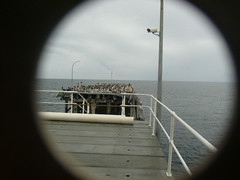Coles, A.L.. & Knowles, J.G. (2000). Teacher Knowledge and modes of teacher knowing. Researching teaching: Exploring teacher development through reflexive inquiry (pp.5-13). Boston: Allyn and Bacon.
Day, C. (1999). Professional development and reflective practice: purposes, processes and partnerships. Pedagogy, Culture & Society, 7(2), 221-223
Hulbert-Holly, M., & McLoughlin, C. (1989). Professional development and journal writing. In M. Hulbeert-Holly, & C. McLoughlin (Eds.). Perspectives on teacher professional development, (pp 259-283). London: Falmer Press.
Research traditionally was ‘done’ to teachers but rarely impacted upon their teaching lives and to some degree this is still the case. These three readings assert that teachers need to be researchers. Coles and Knowles (2000) discuss the difference between teacher researchers and so called ‘expert researchers’. I concur that teachers need to be researchers and that we need to research our classroom practice in a more cohesive and organised way, but I also see the need for educational research and large style case studies. As a teacher researcher I discover a trend in my teaching or classroom then look further at this trend. To do this I need to be able to read what has been discovered over a variety of classrooms over a period of time.
Another theme in these readings is the importance of the personal aspect of teaching. Cole and Knowles (2000) conclude that you cannot just tell teachers how to behave or think to create an expert teacher. This brought to mind the difference in the student teachers I have supervised. You can tell when someone has got ‘it’. You can train a teacher to say and do the right things, but unless they have that special factor that makes them interesting to the children, they will never be ‘expert’. What is ‘it’? How do we know if we have got ‘it’? Reflection.
It is imperative that teachers reflect on classroom practice and constantly seek ways to improve. I agree with Day (1999) that deliberate reflection seems to be the exception not the rule. Teachers do not have the time to spend on reflection in today’s overcrowded curriculum, and a lot of schools do not promote reflection in their professional development. A colleague in the ICTPD project has introduced the initiative of giving the teachers in her cluster one day of professional development and then one day to reflect on and plan how to use that professional development. Maybe there is hope yet! This article by Day also agrees with Cole & Knowles that it is the personal side of teaching that makes the difference. The emotional self is important in reflection and becoming a systematic inquirer. Day also raises the point, though, that teachers rarely concern themselves with the ethical justifications of the teaching. This really got me thinking. Do I ever consciously take ethics into account?
Day states that it is imperative to share your reflections with colleagues. This is an argument which is taken up even more strongly in the article by Holly and McLoughlin (1989). This article was an easy and enjoyable read. It motivated me to begin a teaching reflection journal. But I think a journal on its own is not enough. It is the communication between peers discussing the content of the journals that really makes the difference. Maybe what is needed is not a reflection journal, but a reflection blog. A place where others can comment on your reflections and you can enter into a dialogue.
These articles led me to realise I engage in reflection but not in a coherent manner. I think the best way to ensure that teachers reflect is to have a mentor or critical friend. However something stands in the way of us developing these vital mentoring relationships. I may be generalising, but teachers get a lot of bad press and suggesting you could do better is making yourself vulnerable to criticism. This is a terribly sad state of affairs.
technorati tags:education, professional_development, reflective_practice
Blogged with Flock





1 comment:
.... but Jane all reflection is 'messy'. Pulling the threads together takes time.
constructivism in action ..... LOL
Cool blog!!! Keep it up :-)
Greg
Post a Comment